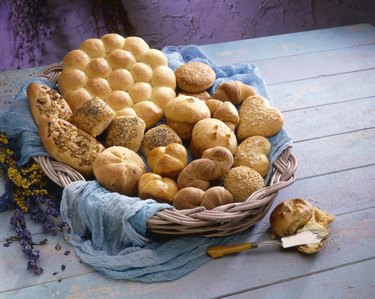
Bread and potatoes aren't necessarily unhealthy, but you may choose to exclude them from your diet or eat them in small amounts if you have diabetes to help prevent blood sugar spikes. Low-carb weight-loss diets such as the Atkins diet exclude bread and potatoes because they're high in carbohydrates. Calories are ultimately the most important factor in weight loss, however, so you can still lose weight without avoiding bread and potatoes as long as you count your calories and create a caloric deficit.
Carbohydrates in Bread and Potatoes
Video of the Day
If you have diabetes, a health care provider may work with you to determine the right amount of carbs you should eat per day based on your body composition and activity level. If you're trying to limit your carb intake, you might need to eat bread and potatoes in small amounts, or you may choose to avoid them completely. Just one slice of bread gives you about 50 grams of carbohydrates, and the American Diabetes Association recommends eating no more than 45 to 60 grams of carbs at one meal, unless otherwise directed by your health care provider.
Video of the Day
The Glycemic Index
The glycemic index is a scale that indicates how quickly a food raises your glucose levels. Potatoes and white bread are high on the glycemic index, which means that if you have diabetes you need to limit your intake of them and combine them with foods that have a low GI to balance them out. Stone-ground whole-wheat bread and pumpernickel bread are actually low on the glycemic index, so you don't need to eliminate bread completely.
Calories in Bread and Potatoes
If you want to lose weight, you need to burn more calories than you consume. This doesn't mean you can't eat bread and potatoes, as long as you're counting your calories. Excluding these from your diet and replacing them with lower-calorie options could help you create a calorie deficit, however. Both white and wheat bread contain about 75 calories per slice. A plain baked potato with its skin contains about 160 calories. Ultimately, calories matter more than carbs when it comes to dieting for weight loss.
Low-Carb, High-Protein Diets
A study published in "Diabetes" in 2009 found that low-carb diets don't help you lose weight any more than low-fat diets. In a study published in 2010 in the "New England Journal of Medicine," scientists found that high-protein/low-carb diets are the most effective for weight loss compared to low-protein/low-carb, low-protein/high-carb and high-protein/high-carb diets. The scientists suggested the reason may be that protein-rich foods are more satiating than carbohydrate-rich foods, causing you to take in fewer calories.
Replacement Foods
Find low-carb recipes that use cauliflower as substitutes for both potatoes and bread. Using a food processor, you can blend cauliflower florets with cream or butter, herbs and salt, to make "mashed potatoes." If a recipe requires potatoes, you can often replace them with another root vegetable, such as carrots or beets. If you simply need bread slices for a sandwich, try making a wrap with leafy greens like lettuce or collard greens instead.
- American Diabetes Association: Types of Carbohydrates
- USDA National Nutrient Database: Bread, White
- USDA National Nutrient Database: Bread, Wheat
- USDA National Nutrient Database: Potato, Baked, Flesh and Skin, Without Salt
- American Diabetes Association: Glycemic Index and Diabetes
- Diabetes: Low-Fat Versus Low-Carbohydrate Weight Reduction Diets
- Huffington Post: Low-Carb? Don't Starve: Veggie Alternatives to Pasta, Rice and Bread
- New England Journal of Medicine: Diets With High or Low Protein Content and Glycemic Index for Weight-Loss Maintenance